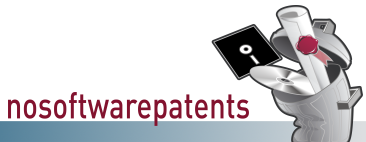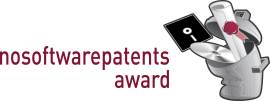| English | Deutsch |

![- Logo]](../images/layout007-small.png)
| Home |
| Software Patent of the year 2006 |
| About |
| Supporters |
| Background |
| News |
| Press November |
| Links |
| Contact |
| Imprint |
Press – October
In this section, the press is presented with up-to-date information about the nosoftwarepatents-award 2006 and other planned activities. We provide journalists with background insights as well as comments by experts and company representatives. Please contact: Harald Talarczyk, authentikom
info@nosoftwarepatents-award.com
Tel: +49 228 / 2804949
Fax: +49 228 / 2803250
Monopoly on software download for device control no software patent?
Download of updates for device control protected by European patent // "Software patent of September" as a prime example for the patent granting practice of the European Patent Office // For Philips, owner of the monopoly, EP1044400 is not a software patent // Election of the "software patent of 2006" has started
October 5, 2006. The patent monopoly EP1044400 on the internet-download of software-updates for device control has been elected to be the "software patent of September" within the information campaign nosoftwarepatents-award. The patent of the Dutch Philips group takes first place with 30 percent of the internet votes, ahead of four other software patents. On the second place follows – with around 26 percent of all votes – a patent of Sagem which monopolizes the mobile download of geographical data with navigation systems. The European Patent Office (EPO) granted all five patents in spring 2006. Experts claim that this was against the law as software is excluded from being patented. The nosoftwarepatents-award and the election of the "software patent of the year 2006" is supported by 1&1 Internet, GMX, MySQL, Red Hat, CAS und Jedox.
The patent claims of EP1044400 describe the practice of downloading a device driver from the internet and using it for operating devices. The organisers of the nosoftwarepatents-award took the patent specifications literally and expressed the patent claims together with the related patent infringements in a language everyone can understand. They point out that, according to the principle patented by Philips, standard-computers with internet connection are updated with drivers in order to operate peripheral equipment of PCs (e.g. a printer). In a longer statement Philips challenges the observation that EP1044400 is a software patent.
Philips: EP1044400 is not a software patent
A Philips spokeswoman summarizes the position of the company: "This patent describes a technical invention to simplify the complex time-consuming manual work to program universal remote controls to just a few seconds of waiting for a personal profile on your screen. The invention is used in the Philips Pronto product line, a new class of innovative programmable touch screen remote controls for intuitive operation. It is clear from the patent description that the invention applies to universal remote controls, telephones and household appliances. Therefore, concern expressed by the authors of the Nosoftwarepatents-award-website that this invention would apply to PCs in general, is unfounded."
Patent specifications describe a software patent
According to campaign manager Harald Talarczyk the statement of Philips is inconsistent with the patent filed by the company: "Although the patent mentions remote controls and other devices, the patent claims, which are crucial for the validity of EP1044400, refer in general terms to 'the programming of a device control' – including a graphical user interface (GUI). The fifth claim clearly specifies that a 'software program...for execution on a computer' is involved. It remains open which type of device the user operates by means of the software installed on the device control. Whether the patent refers to standard-PCs or only to devices for remote control that include touch screens does not make a difference for categorizing EP1044400 as a software patent. The EPO should answer the question why a vast number of this type of patents is granted in Europe. To our request for a comment the EPO refused to make any statement."
The patent granting practice of the European Patent Office is criticized
Oliver Lorenz from EMCITA (European Media, Communication and Information Technology Association) comments: "The usage of a computer and an internet connection – both known at the time of the patent application – in order to download data on a – also well-known –remote control, may count as a nice business idea. But what is the measurable new idea, verifiable for third parties, if known devices are used as intended? If you consider that after inventing the telephone a telephone line was used in order to transmit a shopping list or to call a taxi! And how is the EPO going to decide, if there is updated a PC in a company network – instead of a remote control being updated by means of the internet – and someone files an application for such a patent? The patent EP1044400 illustrates the problems of the European Patent Office (EPO): Since the condition of technicity has been abandoned, the Office lacks measures to judge an invention to be patentable as a result of certain qualities of a novelty; its granting practice lacks the necessary criteria." ( More)
Election for the "software patent of 2006" has started
The information campaign nosoftwarepatents-award enters the decisive
stage: The seven "winners" from February to September are nominated for the election of the "software patent of 2006", taking place in October. Internet-users can chose the software
patent that, in their opinion, is the most harmful. Among the
nominated candidates are two patents of Philips and patents of
Siemens, Nutzwerk, Techem, Lucent and NTT.
| Previous Software Patents of the Month |
| > September |
| > August |
| > July |
| > June |
| > May |
| > April |
| > March |
| Press Archive |
| > Oktober |
| Philips | |
| EMCITA |
| > September |
| > August |
| > July |
| > June |
| > May |
| > April |
| > March |
